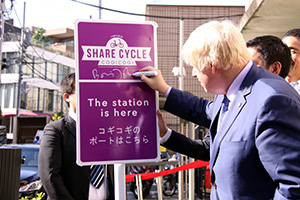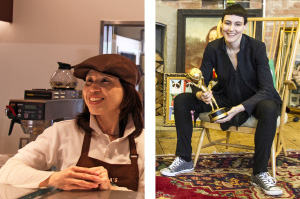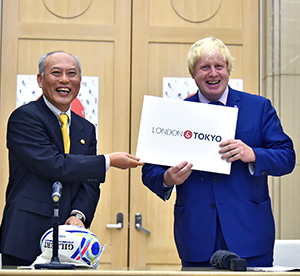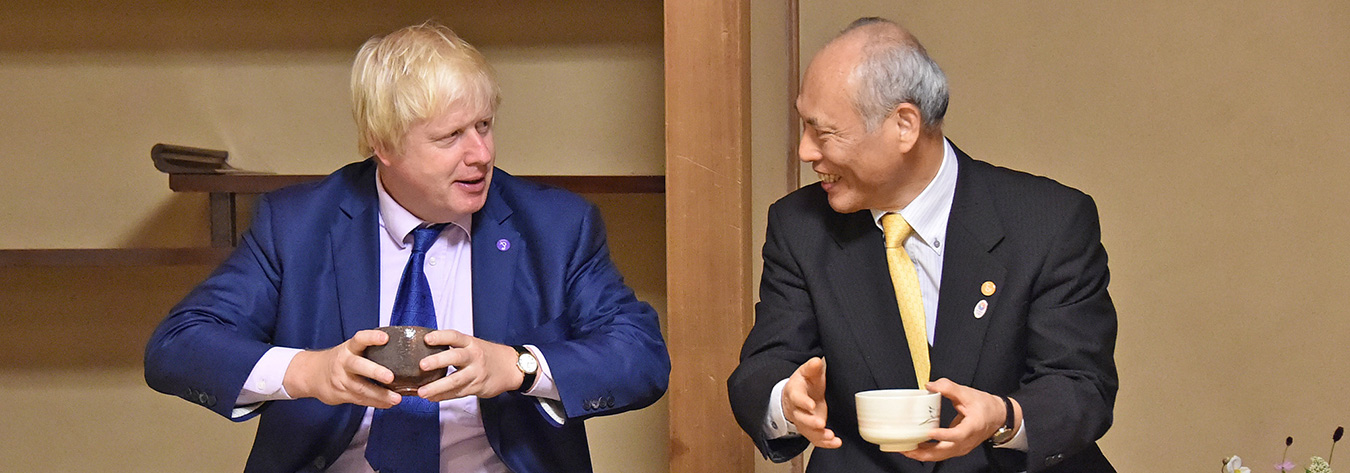
Boris Johnson visited a cycle scheme in Shibuya.
The ties were reflected in the establishment of a friendship relationship on 14 October, during last month’s trade mission to Japan by Mayor of London Boris Johnson. This was followed by a reciprocal visit to London by Governor of Tokyo Yoichi Masuzoe. It is hoped the Joint Declaration will strengthen bonds andenable joint tackling of common challenges to improve quality of life.
Speaking to the Japan Society in London on 30 October, Masuzoe said he was very excited to sign the agreement, adding that the two cities were closer than ever, and reminiscing warmly about Johnson’s exploits in Tokyo.
Visiting Japan primarily to promote London as a major investment destination, Johnson shared his experiences of the London 2012 Olympic and Paralympic Games.
This was warmly received. As a country leading in diversity and inclusion, the UK’s hosting, in particular, of the Paralympic Games—widely accepted to have been the Games that put the Paralympic Olympiad on the world stage—has been insightful, said Masuzoe.
“Tokyo 2020 will embody the spirit of the Games”, he said. “We will work to ensure that Tokyo is a barrier-free city, accessible to all and welcoming to all, irrespective of physical and mental challenges”.
This will mean addressing not only physical infrastructure, but also soft assets. Work is underway to increase the number of volunteers who can speak foreign languages and to provide advice on ways people can be more pro-active in helping each other.
Masuzoe met Lord Holmes MBE, former director of Paralympic integration at the London Organising Committee of the Olympic and Paralympic Games, and Sir Philip Craven MBE, president of the International Paralympic Committee, to discuss how to train volunteers—both able-bodied and disabled—to support the Games.
Environment
Exploring the capitals’ geographical similarities, Masuzoe went on a fact-finding mission to London’s waterfront developments and transport services.
“Tokyo’s waterfront land is actually 20 times the size of [that of] the city of London”, he said. “To make this more accessible and easier for people to experience, we will start seven new boat routes”.
But with targets to reduce energy consumption by 20% before 2020 and increase renewable energy use from 6% to 20% by 2024, Tokyo is also exploring mainstream transport options. It is advocating the use of hydrogen-fuelled vehicles by providing subsidies, while expanding use of other green-energy sources.
“The legacy of the 2020 Games will be a more sustainable society”, Masuzoe said. “We will make Tokyo cleaner and more liveable by encouraging the development and high use of hydrogen fuel vehicles. We will show the world again what Tokyo can do in developing infrastructure suited to the needs of the time”.
The hydrogen industry is one in which Johnson is especially active. In 2010, Transport for London launched the UK’s first—and Europe’s largest—fleet of hydrogen-powered buses, which is to be expanded in 2016.
By the end of this year, Toyota Motor Corporation will provide London with 12 new Mirai hydrogen-powered vehicles. Having said that London is a key location in the adoption of such transport over the next two years, Johnson was welcomed by the manufacturer, which was keen to discuss the city’s potential in this market.
“We applaud the mayor’s commitment to embracing new technology in his mission to make London a leading global city for low-emission, low-carbon transport”, said Paul Van der Burgh, president and managing director of Toyota (GB) PLC. “Transport for London and the city it serves will provide an ideal environment for Mirai”.
In another environmentally friendly move, Masuzoe is developing cycle schemes. One, in Shibuya Ward, was tested by Johnson who heard from representatives of the operator, Cogicogi Co., Ltd., and Mayor of Shibuya Ken Hasebe, while sharing tips from London.
In sport, Masuzoe said it is just as important to learn from the UK’s recent successful hosting of the Rugby World Cup (RWC) as it is from London 2012, adding that he is, to all intents and purposes, “treating them as a single event”.
He visited Trafalgar Square’s RWC fan zone—a venue for live viewing and refreshments—commenting that such places would be important in Tokyo for people to “easily gather and have fun”. He also attended a reception at the Japan Pavilion, established to publicise the RWC 2019 and the attractions of its host cities.
And, together with Johnson, he attended the RWC 2015 final. This was a symbolic meeting, following Johnson’s official transfer of the ball to Masuzoe at the Tokyo Metropolitan Government office just weeks earlier.
Business boost
Central to the pair’s messages was a desire to attract investment as a means of creating jobs and building on existing growth.
“We will form an international business hub”, said Masuzoe, “which gathers capital, talent and companies from around the world”.
Meanwhile, Johnson said his Japan visit was an opportunity to “bang the drum for London”. Aside from talking to senior politicians, in both formal and informal settings, such as a tea ceremony, he met leaders in technology and innovation, as well as academics and entrepreneurs.
Championing the strength of UK brands, he applauded British representatives at Hankyu Department Store’s British Fair in Osaka, adding that the welcome they received had been beyond his expectations.

Chief executive of Lola’s Cupcakes franchise owner A&S&R Co., Ltd., Aya Hoshino (left), and Sarah Wood, co-founder and co-chief executive of video ad tech firm Unruly
In innovation, he supported the launch of video ad tech firm Unruly’s new office in Tokyo. The firm’s co-founder and co-chief executive Sarah Wood said there is a huge opportunity for her business.
“Despite Japan currently having the third-largest ad market in the world, only 3% of digital ad spend in 2014 was on online video”, she said. “That’s going to change massively over the coming months, with some predicting that the Japanese online video market will be worth nearly $1bn [£664mn] by 2017”.
In recognition of Wood’s entrepreneurial spirit, Johnson appointed her a global technology ambassador for London. She will join others to promote the capital’s strengths in this sector.
The approach has not been lost on Masuzoe. He cited a British firm that the Tokyo government helped enter the Japan market.
“It is important to share best practices in the area of business and finance”, he said. “I have learned to do this from the City of London”.
Memorandum of Understanding

Yoichi Masuzoe and Boris Johnson unveiled a new London–Tokyo partnership.
- Urban development
- Environment
- Cultural exchange
- Transport
- Tourism
- Hosting major sporting events
London first for fintech
By Julian Ryall
London is the undisputed world capital for fintech—the shorthand term for the financial technology that underpins the modern financial services sector—and is eager to share its expertise with another of the world’s key financial hubs.
Mayor of London Boris Johnson underlined the edge that the city has in this area during his Japan mission.
“Londoners are embracing financial technology”, he said in a presentation at the British Embassy Tokyo. “As our expertise flourishes in this area, I am delighted that companies based in London are taking their goods to Japan. And we are now sharing that knowledge and experience with our Japanese counterparts to further fuel this innovation and growth”.
Venture capital investment in London fintech has soared from £24mn in the whole of 2010 to £312mn in the first six months of 2015 alone. During the last decade, London has attracted 1,000 international technology investment projects. This is not only more than any other city, but more than any other country in Europe.
David Slater, director of international business development at official London promotion firm London & Partners, said there is change afoot in the finance sector—and it is coming through technology.
“As one of the world’s largest economies, Japan is an important trading partner for London”, he said. “From financial services firms to technology giants, London already serves as a key international hub for a number of leading Japanese businesses with a global footprint”.
And that relationship is a two-way street, he said.
“Japan offers London—and UK—businesses a perfect springboard into the rapidly developing [Asia–Pacific] markets. We look forward to increased collaboration between the two countries, particularly when welcoming more ambitious Japanese businesses looking to establish a regional or global headquarters in London”, he added.
London has seen a rapid increase in foreign businesses expanding or setting up their headquarters, with about 40% of the world’s top firms having a European or global headquarters in London. London & Partners, the mayor’s inward investment firm, last year helped 270 businesses set up or expand in the city, creating nearly 5,000 jobs.



